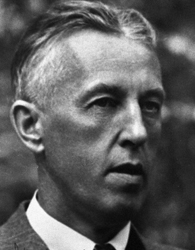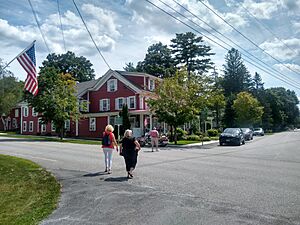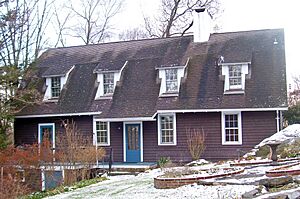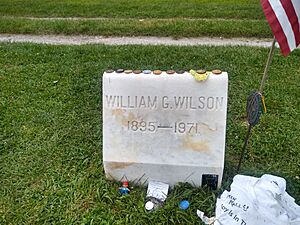Bill W. facts for kids
Quick facts for kids
Bill W.
|
|
|---|---|

Bill Wilson, date unknown
|
|
| Born |
William Griffith Wilson
November 26, 1895 East Dorset, Vermont, U.S.
|
| Died | January 24, 1971 (aged 75) Miami, Florida, U.S.
|
| Resting place | East Dorset Cemetery, East Dorset, Vermont |
| Education | Norwich University |
| Occupation | Salesman, military officer, activist |
| Known for | co-founding Alcoholics Anonymous |
| Spouse(s) |
Lois W.
(m. 1918) |
| Military career | |
| Allegiance | |
| Branch | |
| Years | 1916–1918 |
| Rank | Second lieutenant |
| Unit | Vermont National Guard |
| Conflicts | |
William Griffith Wilson (November 26, 1895 – January 24, 1971), also known as Bill Wilson or Bill W., was the co-founder of Alcoholics Anonymous (AA).
AA is an international mutual aid fellowship with about two million members worldwide belonging to AA groups, associations, organizations, cooperatives, and fellowships of alcoholics helping other alcoholics achieve and maintain sobriety. Following AA's Twelfth Tradition of anonymity, Wilson is commonly known as "Bill W." or "Bill". To identify each other, members of AA will sometimes ask others if they are "friends of Bill". After Wilson's death, and amidst controversy within the fellowship, his full name was included in obituaries by journalists who were unaware of the significance of maintaining anonymity within the organization.
Wilson's sobriety from alcohol, which he maintained until his death, began December 11, 1934. In 1955, Wilson turned over control of AA to a board of trustees. Wilson died in 1971 of emphysema from smoking tobacco complicated by pneumonia. In 1999, Time listed him as "Bill W.: The Healer" in the Time 100: The Most Important People of the Century.
Contents
Early life

Wilson was born on November 26, 1895, in East Dorset, Vermont, the son of Emily (née Griffith) and Gilman Barrows Wilson. He was born at his parents' home and business, the Mount Aeolus Inn and Tavern. His sister, Dorothy, was born in 1898. His paternal grandfather, William C. Wilson, a hotelier and second-generation marble worker, was also an alcoholic. Influenced by the preaching of an itinerant evangelist, some weeks before, William C. Wilson climbed to the top of Mount Aeolus, had a spiritual experience and quit drinking.
Wilson's father left for Canada in 1905, and his mother left soon after to study osteopathic medicine in Massachusetts. Abandoned by his parents, he and his sister were raised by their maternal grandparents, Fayette and Ella Griffith.
In 1908 he met Mark Whalon, a fellow East Dorset resident who was nine years Wilson's senior. Whalon became Wilson's closest childhood friend, and introduced him to the world of ideas. Whalon continued to be a confidant, counselor, and emotional support to Wilson, even after Wilson became world famous, and as of Whalon's death in 1956 was still Wilson's best friend. Wilson later wrote of him, "He was a sort of uncle or father to me."
Wilson became the captain of his high school's football team, and the principal violinist in its orchestra. He dealt with a serious bout of depression at the age of 17, following the death of his first love, Bertha Bamford, who died of complications from surgery.
A spiritual program for recovery
In November 1934, Wilson was visited by an old drinking companion, Ebby Thacher. Wilson was astounded to find Thacher had been sober for weeks under the guidance of the evangelical Christian Oxford Group. Wilson took some interest in the group, but shortly after Thacher's visit, he was again admitted to Towns Hospital to recover from a bout of drinking. This was his fourth and last stay at Towns under Silkworth's care and he showed signs of delirium tremens. There, Bill W had a "White Light" spiritual experience and quit drinking. Earlier that evening, Thacher had visited and tried to persuade him to turn himself over to the care of a Christian deity who would liberate him from alcohol. According to Wilson, while lying in bed depressed and despairing, he cried out, "I'll do anything! Anything at all! If there be a God, let Him show Himself!" He then had the sensation of a bright light, a feeling of ecstasy, and a new serenity. He never drank again for the rest of his life. Wilson described his experience to Silkworth, who told him, "Something has happened to you I don't understand. But you had better hang on to it".
Wilson joined the Oxford Group and tried to help other alcoholics. They did not get sober, but Wilson kept sober himself. During a failed business trip to Akron, Ohio, Wilson was tempted to drink again and decided that to remain sober he needed to help another alcoholic. He called phone numbers in a church directory and eventually secured an introduction to Bob Smith, an alcoholic Oxford Group member. Wilson explained Silkworth's theory that alcoholics suffer from a physical allergy and a mental obsession. Wilson shared that the only way he was able to stay sober was through having had a spiritual experience. Smith was familiar with the tenets of the Oxford Group, and upon hearing of Wilson's experience, "began to pursue the spiritual remedy for his malady with a willingness that he had never before been able to muster. After a brief relapse, he sobered, never to drink again..." Wilson and Smith began working with other alcoholics. After that summer in Akron, Wilson returned to New York where he began having success helping alcoholics in what they called "a nameless squad of drunks" in an Oxford Group there.
In 1938, after about 100 alcoholics in Akron and New York had become sober, the 'fellowship' decided to promote its program of recovery through the publication of a book, for which Wilson was chosen as primary author. The book was given the title Alcoholics Anonymous and included the list of suggested activities for spiritual growth known as the Twelve Steps. The movement itself took on the name of the book. Bill incorporated the principles of nine of the Twelve Traditions, (a set of spiritual guidelines to ensure the survival of individual AA groups) in his foreword to the original edition; later, Traditions One, Two, and Ten were clearly specified when all twelve statements were published. The AA general service conference of 1955 was a landmark event for Wilson in which he turned over the leadership of the maturing organization to an elected board.
In 1939, Wilson and Marty Mann visited High Watch Farm in Kent, CT. They would go on to found what is now High Watch Recovery Center, the world's first alcohol and addiction recovery center founded on Twelve Step principles.
Political beliefs
Wilson strongly advocated that AA groups have not the "slightest reform or political complexion". In 1946, he wrote "No AA group or members should ever, in such a way as to implicate AA, express any opinion on outside controversial issues – particularly those of politics, alcohol reform or sectarian religion. The Alcoholics Anonymous groups oppose no one. Concerning such matters they can express no views whatever." Reworded, this became AA's "Tradition 10".
The final years
During the last years of his life, Wilson rarely attended AA meetings to avoid being asked to speak as the co-founder rather than as an alcoholic. A heavy smoker, Wilson eventually suffered from emphysema and later pneumonia. He continued to smoke while dependent on an oxygen tank in the late 1960s. While notes written by nurse James Dannenberg say that Bill Wilson asked for whiskey four times (December 25, 1970, January 2, 1971, January 8, 1971, and January 14, 1971) in his final month of living, he drank no alcohol for the final 36 years of his life.
Archives at Stepping Stones

Personal letters between Wilson and Lois spanning a period of more than 60 years are kept in the archives at Stepping Stones, their former home in Katonah, New York, and in AA's General Service Office archives in New York.
Niacin therapy
Wilson met Abram Hoffer and learned about the potential mood-stabilizing effects of niacin. Wilson was impressed with experiments indicating that alcoholics who were given niacin had a better sobriety rate, and he began to see niacin "as completing the third leg in the stool, the physical to complement the spiritual and emotional". Wilson also believed that niacin had given him relief from depression, and he promoted the vitamin within the AA community and with the National Institute of Mental Health as a treatment for schizophrenia. However, Wilson created a major furor in AA because he used the AA office and letterhead in his promotion.
Spiritualism
For Wilson, spiritualism was a lifelong interest. One of his letters to adviser Father Dowling suggests that while Wilson was working on his book Twelve Steps and Twelve Traditions, he felt that spirits were helping him, in particular a 15th-century monk named Boniface. Despite his conviction that he had evidence for the reality of the spirit world, Wilson chose not to share this with AA. However, his practices still created controversy within the AA membership. Wilson and his wife continued with their unusual practices in spite of the misgivings of many AA members. In their house they had a "spook room" where they would invite guests to participate in seances using a Ouija board.
Legacy
In 2021, Alcoholics Anonymous reported having over 120,000 registered local groups and over 1.9 million active members worldwide.
Wilson has often been described as having loved being the center of attention, but after the AA principle of anonymity had become established, he refused an honorary degree from Yale University and refused to allow his picture, even from the back, on the cover of Time. Wilson's persistence, his ability to take and use good ideas, and his entrepreneurial flair are revealed in his pioneering escape from an alcoholic "death sentence", his central role in the development of a program of spiritual growth, and his leadership in creating and building AA, "an independent, entrepreneurial, maddeningly democratic, non-profit organization".
Wilson is perhaps best known as a synthesizer of ideas, the man who pulled together various threads of psychology, theology, and democracy into a workable and life-saving system. Aldous Huxley called him "the greatest social architect of our century", and Time magazine named Wilson to their "Time 100 List of The Most Important People of the 20th Century". Wilson's self-description was a man who, "because of his bitter experience, discovered, slowly and through a conversion experience, a system of behavior and a series of actions that work for alcoholics who want to stop drinking."
Biographer Susan Cheever wrote in My Name Is Bill, "Bill Wilson never held himself up as a model: he only hoped to help other people by sharing his own experience, strength and hope. He insisted again and again that he was just an ordinary man".
Wilson bought a house that he and Lois called Stepping Stones on an 8-acre (3 ha) estate in Katonah, New York, in 1941, and he lived there with Lois until he died in 1971. After Lois died in 1988, the house was opened for tours and is now on the National Register of Historic Places; it was designated a National Historic Landmark in 2012.
Writings
- Alcoholics Anonymous
- Twelve Steps and Twelve Traditions
- A. A. Comes of Age
- A.A. Service Manual/Twelve Concepts for World Services
- As Bill Sees It
- A. A. Way of Life
- Bill W: My First 40 Years
- The Language of the Heart: Bill W.'s Grapevine Writings
- various other articles
- published letters
- etc.
See also
- Bill W. and Dr. Bob (play)
- Jim Burwell
- Lucille Kahn
- Rowland Hazard III ("Rowland H")


